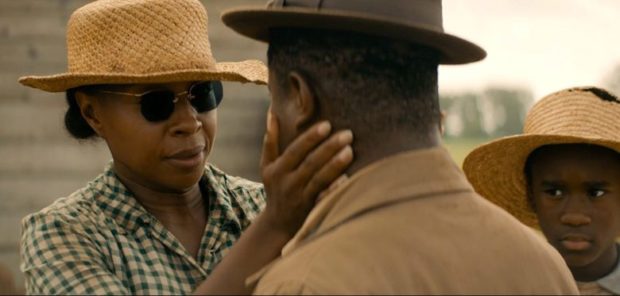 A film by Dee Rees bravely explores the plight of two families, white and black, trying to scrape a living from a Mississippi cotton farm and embroiled in the racial violence and oppression endemic to the 1940s.
A film by Dee Rees bravely explores the plight of two families, white and black, trying to scrape a living from a Mississippi cotton farm and embroiled in the racial violence and oppression endemic to the 1940s.
Mudbound tells the stories of people who don’t often get their stories told: poor white farmers and black sharecroppers in the South during the 1940s. Directed by Dee Rees, and adapted by Rees and Virgil Williams from a novel of the same name by Hillary Jordan, the film bravely explores the plight of two families, white and black, trying to scrape a living from a cotton farm and embroiled in the racial violence and oppression endemic to the time. The title Mudbound refers to the ever-present muck of the Mississippi land, where the rain can pour down for days and ruin poor people’s chances of planting or harvesting a crop.
We first meet Laura McAllan, a shy 30-something Memphis virgin played by Carey Mulligan, as she meets and marries her husband Henry, played by Jason Clarke. We learn about Laura from her voice-over narration, and naturally we settle in to having her be our guide through the story. But Mudbound is more complex than that. Rees interweaves multiple narrators, six in all, so that each aspect of the plot doubles as a new revelation of character.
Henry McAllan buys a large spread of land in Mississippi and moves his family there, including his viciously racist father, played by Jonathan Banks. Working the land, which they had hoped to buy themselves, are the Jacksons, a black family, or “colored” as they said back then, led by the patriarch Hap (Rob Morgan) and his strong, imposing wife Florence (Mary J. Blige). It’s a large family of sons and daughters, and what is evident from the outset is that they are proud and determined, but also subservient to the new white landowners, and to white people in general, not by choice, but by the social order that we know today as “Jim Crow.”
World War II becomes the catalyst of change, and of trouble in this story, as it was in the nation. Henry’s hard-drinking, devil-may-care brother Jamie, played by Garrett Hedlund, becomes a bomber pilot. The Jacksons’ oldest son, Ronsel, played by Jason Mitchell, becomes a sergeant in a Negro tank division in Europe. Both of them suffer trauma and return home profoundly changed. One of the strongest and bitterest truths of the film is its depiction of black GIs putting their lives on the line, only to come home to their old second-class status, subject to humiliation, abuse, and worse, by white people. Ronsel doesn’t adjust well to this reality, and Jamie, a battle fatigued alcoholic, strikes up a friendship with him based on their shared experience as veterans. Their scenes together are among the movie’s best.
Mudbound is beautifully shot by Rachel Morrison. The dialogue veers only occasionally into earnestness, and the screenplay excels especially in the inner musings of the black characters, whose thoughts reveal much about the never-ending daily struggle of African Americans in the early 20th century, ostensibly free from slavery but still held down by racial and economic constraints enforced through fear.
Produced by Netflix, the film had a brief theatrical run and is now streaming on that network, which is apparently the marketing strategy for Netflix original films, at least at this time. Mudbound is the kind of courageous and unflinching work that we really need right now.

The story of a man repeatedly imprisoned in Germany for being gay, and his odd relationship to a straight drug addict. You probably know...

Mike Leigh’s 1988 breakthrough film already contains what makes him great: working class issues, funny believable characters, and a fine sensitivity for the miseries...

A portrait of the immensely popular singer profiles Linda Ronstadt’s remarkable career, in which she succeeded in making her own choices that went against...